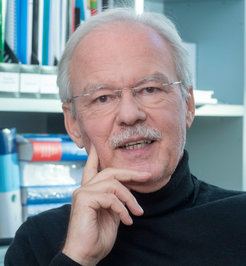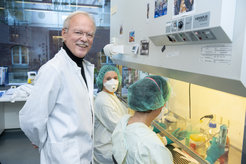Stefan Kaufmann becomes Emeritus Director at the Max Planck Institute for Biophysical Chemistry
Together with his team, Stefan H. E. Kaufmann has advanced the development of a new vaccine against tuberculosis, which could also serve as an interim solution for Covid-19. The infection biologist will continue his research with an emeritus group in Göttingen.

Kaufmann has been researching the pathogens of epidemics such as AIDS, SARS, MERS, and tuberculosis throughout his whole scientific career. For four decades, the tubercle bacillus has been a particular focus of the Max Planck researcher. No other infectious disease kills more people: Last year 10 million people worldwide newly developed tuberculosis disease, and 1.5 million people died from it. It is caused by mycobacteria, which mainly attack the lungs, but can also affect any other organ. The disease mainly hits the poor, Kaufmann warns again and again. He is committed at different levels to ensure that vaccines also benefit the poorest countries and supports countries in Africa to build up expertise in immunology and infection biology.
To this day, a single vaccine against tuberculosis exists: Bacillus Calmette Guérin (BCG). This vaccine contains attenuated bovine tuberculosis pathogens. “We now know that it can only protect small children, and even these not consistently”, the infection biologist explains. Since the 1990s, he and his group have already been working on an improved successor. To this end, Kaufmann’s group succeeded to genetically modify the attenuated vaccine strain BCG in such a way that immune cells can recognize the pathogens more easily.
This new vaccine, called VPM1002, is currently in two phase III clinical trials in which adult volunteers in India are tested for prevention of tuberculosis. These studies are expected to be completed next year and Kaufmann is hopeful: “The results so far show that vaccination with VPM1002 is safer and more effective than standard vaccination with BCG.”
A further study on the protection of HIV-exposed infants against tuberculosis in numerous countries in sub-Saharan Africa is to start this year. VPM1002 shows a significantly better safety profile than the BCG vaccine strain, which, therefore, is not recommended for vaccination of HIV-exposed newborns.
Interim solution for Covid-19

Controlled studies have shown that BCG – as a so-called bystander vaccine – could also help against the novel corona virus. “BCG stimulates innate immunity and can protect against viral respiratory infections,” the scientist says. Two further phase III studies aim at investigating whether VPM1002 can also protect against infection with SARS-CoV-2 and prevent severe disease progression. The first study will involve healthcare workers at increased risk of infection. The second will be conducted with elderly people who are particularly at risk. The studies will be carried out at several hospitals in Germany; a central clinic will be the Hanover Medical School.
In addition to the applications presented here, VPM1002 promises hope not least in cancer. So it can prevent the recurrence of bladder tumors in patients who do not respond properly to treatment with BCG.
Prediction of a protective immune response against tuberculosis
Supported by the Bill & Melinda Gates Foundation, Kaufmann has initiated a large international North-South network in recent years involving several study centers in Africa. The goal of this network is to characterize so-called biosignatures that can predict a protective immune response against tuberculosis. The researchers have already succeeded in identifying so-called transcriptome and metabolome biosignatures that predict the risk of active tuberculosis. Over the next few years, the infection biologist hopes to combine these two areas, namely clinical vaccine trials and biosignature design. Using transcriptome and metabolome data obtained in the clinical vaccination studies, Kaufmann hopes to define biosignatures that can predict the protective efficacy and safety of the vaccine.
In 2004, the Max Planck Society granted the license for the VPM1002 vaccine to the company Vakzine Project Management (VPM). Starting in 2012, the company will further develop the vaccine together with the Serum Institute of India, one of the largest vaccine manufacturers worldwide.
Stefan H. E. Kaufmann
studied biology at the University of Mainz, received his doctorate there in 1977, and habilitated at the Free University of Berlin four years later. He says that he came to his field of expertise through his mentor Paul Klein who taught him how inspiring science can be. From Berlin, he moved to the MPI for Immunobiology in Freiburg. The University of Ulm appointed him as professor in 1983. Ten years later, he returned to the Max Planck Society with the task of founding the MPI for Infection Biology in Berlin. There, he headed the Department of Immunology until his retirement in 2019 and continues to be scientifically active as an Emeritus Director. Since 1998, he has been honorary professor at the Charité – Universitätsmedizin Berlin.
Kaufmann has received numerous awards for his research, including the Smith Kline Beecham Science Prize, the Merckle Research Prize, and the Gardner Middlebrook Prize. He is a member of the Scientific Academy Leopoldina, the Berlin-Brandenburg Academy of Sciences and Humanities, and the European Molecular Biology Organization. During his career, he has published more than 900 scientific papers and articles to date. As early as 2008, he warned of a pandemic in his book The New Plagues (Wächst die Seuchengefahr?), and already at that time suggested solutions for early surveillance and rapid containment of outbreaks of emerging pathogens. (cr)

